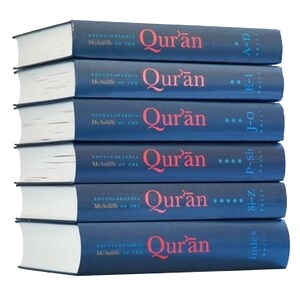 The projected five volumes turned out to be six. |
Edited by a professor at Georgetown University, the Encyclopaedia relies mostly on U.S.-based authors, a fair number of other Westerners and Middle Easterners, and occasional contributors from elsewhere. The writers include Muslims and non-Muslims alike, ranging from the well-known (Oleg Grabar, Nasr Hamid Abu Zayd) to the deeply obscure. The entries tend to be on the short side with the exception of a few essay-length efforts ("Chronology and the Qur'an). Some topics are path-breaking, as the bibliographies make clear ("Colors," "Difficult Passages"), while others review familiar ground ("Basmala"). Some are post-modern prattlings ("Contemporary Practices") while others are models of classic orientalist philology ("Animal Life"). While commentators of the Qur'an are not covered, communities of Muslims are ("Deobandis," "African Americans").
The editor forthrightly takes up the issue of what she calls "two parallel conversations" about the Qur'an, meaning Muslim and non-Muslim scholarship on the holy book. These have tended to exist in separate spheres, one pious, the other inquisitive; she also acknowledges that some authors found her concept of the project tainted and chose to stay away from it. Given the immense sensitivities of the task, and the vast range of views about the role of the Qur'an, she has done a sensible job of embracing "a plurality of method and perspective."